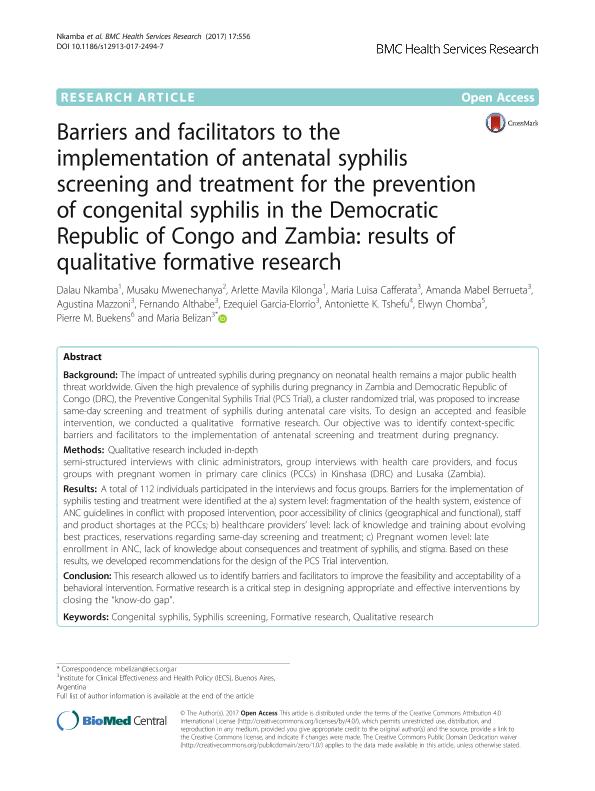Mostrar el registro sencillo del ítem
dc.contributor.author
Nkamba, Dalau
dc.contributor.author
Mwenechanya, Musaku
dc.contributor.author
Kilonga, Arlette Mavila
dc.contributor.author
Cafferata, Maria Luisa
dc.contributor.author
Berrueta, Amanda Mabel

dc.contributor.author
Mazzoni, Agustina

dc.contributor.author
Althabe, Fernando

dc.contributor.author
Garcia Elorrio, Ezequiel

dc.contributor.author
Tshefu, Antoniette K.
dc.contributor.author
Chomba, Elwyn
dc.contributor.author
Buekens, Pierre M.
dc.contributor.author
Belizán, María Melina Eleonora

dc.date.available
2018-04-03T18:10:42Z
dc.date.issued
2017-08
dc.identifier.citation
Nkamba, Dalau; Mwenechanya, Musaku; Kilonga, Arlette Mavila; Cafferata, Maria Luisa; Berrueta, Amanda Mabel; et al.; Barriers and facilitators to the implementation of antenatal syphilis screening and treatment for the prevention of congenital syphilis in the Democratic Republic of Congo and Zambia: results of qualitative formative research; BioMed Central; Bmc Health Services Research; 17; 1; 8-2017; 1-11
dc.identifier.issn
1472-6963
dc.identifier.uri
http://hdl.handle.net/11336/40516
dc.description.abstract
Background The impact of untreated syphilis during pregnancy on neonatal health remains a major public health threat worldwide. Given the high prevalence of syphilis during pregnancy in Zambia and Democratic Republic of Congo (DRC), the Preventive Congenital Syphilis Trial (PCS Trial), a cluster randomized trial, was proposed to increase same-day screening and treatment of syphilis during antenatal care visits. To design an accepted and feasible intervention, we conducted a qualitative formative research. Our objective was to identify context-specific barriers and facilitators to the implementation of antenatal screening and treatment during pregnancy. Methods Qualitative research included in-depth semi-structured interviews with clinic administrators, group interviews with health care providers, and focus groups with pregnant women in primary care clinics (PCCs) in Kinshasa (DRC) and Lusaka (Zambia). Results A total of 112 individuals participated in the interviews and focus groups. Barriers for the implementation of syphilis testing and treatment were identified at the a) system level: fragmentation of the health system, existence of ANC guidelines in conflict with proposed intervention, poor accessibility of clinics (geographical and functional), staff and product shortages at the PCCs; b) healthcare providers’ level: lack of knowledge and training about evolving best practices, reservations regarding same-day screening and treatment; c) Pregnant women level: late enrollment in ANC, lack of knowledge about consequences and treatment of syphilis, and stigma. Based on these results, we developed recommendations for the design of the PCS Trial intervention. Conclusion This research allowed us to identify barriers and facilitators to improve the feasibility and acceptability of a behavioral intervention. Formative research is a critical step in designing appropriate and effective interventions by closing the “know-do gap”.
dc.format
application/pdf
dc.language.iso
eng
dc.publisher
BioMed Central

dc.rights
info:eu-repo/semantics/openAccess
dc.rights.uri
https://creativecommons.org/licenses/by-nc-sa/2.5/ar/
dc.subject
Congenital Syphilis
dc.subject
Syphilis Screening
dc.subject
Formative Research
dc.subject
Qualitative Research
dc.subject.classification
Medicina Critica y de Emergencia

dc.subject.classification
Medicina Clínica

dc.subject.classification
CIENCIAS MÉDICAS Y DE LA SALUD

dc.title
Barriers and facilitators to the implementation of antenatal syphilis screening and treatment for the prevention of congenital syphilis in the Democratic Republic of Congo and Zambia: results of qualitative formative research
dc.type
info:eu-repo/semantics/article
dc.type
info:ar-repo/semantics/artículo
dc.type
info:eu-repo/semantics/publishedVersion
dc.date.updated
2018-03-27T15:18:22Z
dc.journal.volume
17
dc.journal.number
1
dc.journal.pagination
1-11
dc.journal.pais
Reino Unido

dc.journal.ciudad
Londres
dc.description.fil
Fil: Nkamba, Dalau. Ecole de Santé Publique de Kinshasa; República del Congo
dc.description.fil
Fil: Mwenechanya, Musaku. University Teaching Hospital of Lusaka; Zambia
dc.description.fil
Fil: Kilonga, Arlette Mavila. Ecole de Santé Publique de Kinshasa; República del Congo
dc.description.fil
Fil: Cafferata, Maria Luisa. Instituto de Efectividad Clínica y Sanitaria; Argentina
dc.description.fil
Fil: Berrueta, Amanda Mabel. Instituto de Efectividad Clínica y Sanitaria; Argentina
dc.description.fil
Fil: Mazzoni, Agustina. Instituto de Efectividad Clínica y Sanitaria; Argentina
dc.description.fil
Fil: Althabe, Fernando. Consejo Nacional de Investigaciones Científicas y Técnicas; Argentina. Instituto de Efectividad Clínica y Sanitaria; Argentina
dc.description.fil
Fil: Garcia Elorrio, Ezequiel. Instituto de Efectividad Clínica y Sanitaria; Argentina
dc.description.fil
Fil: Tshefu, Antoniette K.. Ecole de Santé Publique de Kinshasa; República del Congo
dc.description.fil
Fil: Chomba, Elwyn. University Teaching Hospital of Lusaka; Zambia
dc.description.fil
Fil: Buekens, Pierre M.. Tulane University; Estados Unidos
dc.description.fil
Fil: Belizán, María Melina Eleonora. Instituto de Efectividad Clínica y Sanitaria; Argentina
dc.journal.title
Bmc Health Services Research

dc.relation.alternativeid
info:eu-repo/semantics/altIdentifier/doi/http://dx.doi.org/10.1186/s12913-017-2494-7
dc.relation.alternativeid
info:eu-repo/semantics/altIdentifier/url/https://bmchealthservres.biomedcentral.com/articles/10.1186/s12913-017-2494-7
Archivos asociados
